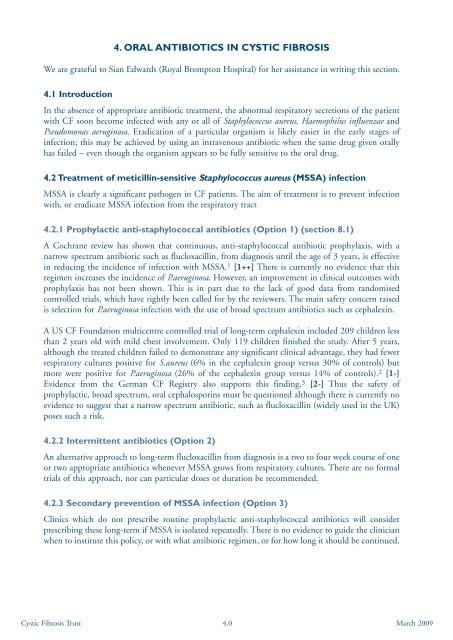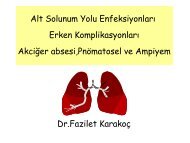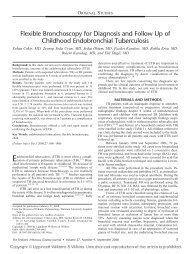Report of the UK Cystic Fibrosis Trust Antibiotic Working Group
Report of the UK Cystic Fibrosis Trust Antibiotic Working Group
Report of the UK Cystic Fibrosis Trust Antibiotic Working Group
You also want an ePaper? Increase the reach of your titles
YUMPU automatically turns print PDFs into web optimized ePapers that Google loves.
4. ORAL ANTIBIOTICS IN CYSTIC FIBROSISWe are grateful to Sian Edwards (Royal Brompton Hospital) for her assistance in writing this section.4.1 IntroductionIn <strong>the</strong> absence <strong>of</strong> appropriate antibiotic treatment, <strong>the</strong> abnormal respiratory secretions <strong>of</strong> <strong>the</strong> patientwith CF soon become infected with any or all <strong>of</strong> Staphylococcus aureus, Haemophilus influenzae andPseudomonas aeruginosa. Eradication <strong>of</strong> a particular organism is likely easier in <strong>the</strong> early stages <strong>of</strong>infection; this may be achieved by using an intravenous antibiotic when <strong>the</strong> same drug given orallyhas failed – even though <strong>the</strong> organism appears to be fully sensitive to <strong>the</strong> oral drug.4.2 Treatment <strong>of</strong> meticillin-sensitive Staphylococcus aureus (MSSA) infectionMSSA is clearly a significant pathogen in CF patients. The aim <strong>of</strong> treatment is to prevent infectionwith, or eradicate MSSA infection from <strong>the</strong> respiratory tract4.2.1 Prophylactic anti-staphylococcal antibiotics (Option 1) (section 8.1)A Cochrane review has shown that continuous, anti-staphylococcal antibiotic prophylaxis, with anarrow spectrum antibiotic such as flucloxacillin, from diagnosis until <strong>the</strong> age <strong>of</strong> 3 years, is effectivein reducing <strong>the</strong> incidence <strong>of</strong> infection with MSSA. 1 [1++] There is currently no evidence that thisregimen increases <strong>the</strong> incidence <strong>of</strong> P.aeruginosa. However, an improvement in clinical outcomes withprophylaxis has not been shown. This is in part due to <strong>the</strong> lack <strong>of</strong> good data from randomisedcontrolled trials, which have rightly been called for by <strong>the</strong> reviewers. The main safety concern raisedis selection for P.aeruginosa infection with <strong>the</strong> use <strong>of</strong> broad spectrum antibiotics such as cephalexin.A US CF Foundation multicentre controlled trial <strong>of</strong> long-term cephalexin included 209 children lessthan 2 years old with mild chest involvement. Only 119 children finished <strong>the</strong> study. After 5 years,although <strong>the</strong> treated children failed to demonstrate any significant clinical advantage, <strong>the</strong>y had fewerrespiratory cultures positive for S.aureus (6% in <strong>the</strong> cephalexin group versus 30% <strong>of</strong> controls) butmore were positive for P.aeruginosa (26% <strong>of</strong> <strong>the</strong> cephalexin group versus 14% <strong>of</strong> controls). 2 [1-]Evidence from <strong>the</strong> German CF Registry also supports this finding. 3 [2-] Thus <strong>the</strong> safety <strong>of</strong>prophylactic, broad spectrum, oral cephalosporins must be questioned although <strong>the</strong>re is currently noevidence to suggest that a narrow spectrum antibiotic, such as flucloxacillin (widely used in <strong>the</strong> <strong>UK</strong>)poses such a risk.4.2.2 Intermittent antibiotics (Option 2)An alternative approach to long-term flucloxacillin from diagnosis is a two to four week course <strong>of</strong> oneor two appropriate antibiotics whenever MSSA grows from respiratory cultures. There are no formaltrials <strong>of</strong> this approach, nor can particular doses or duration be recommended.4.2.3 Secondary prevention <strong>of</strong> MSSA infection (Option 3)Clinics which do not prescribe routine prophylactic anti-staphylococcal antibiotics will considerprescribing <strong>the</strong>se long-term if MSSA is isolated repeatedly. There is no evidence to guide <strong>the</strong> clinicianwhen to institute this policy, or with what antibiotic regimen, or for how long it should be continued.<strong>Cystic</strong> <strong>Fibrosis</strong> <strong>Trust</strong> 4.0March 2009






